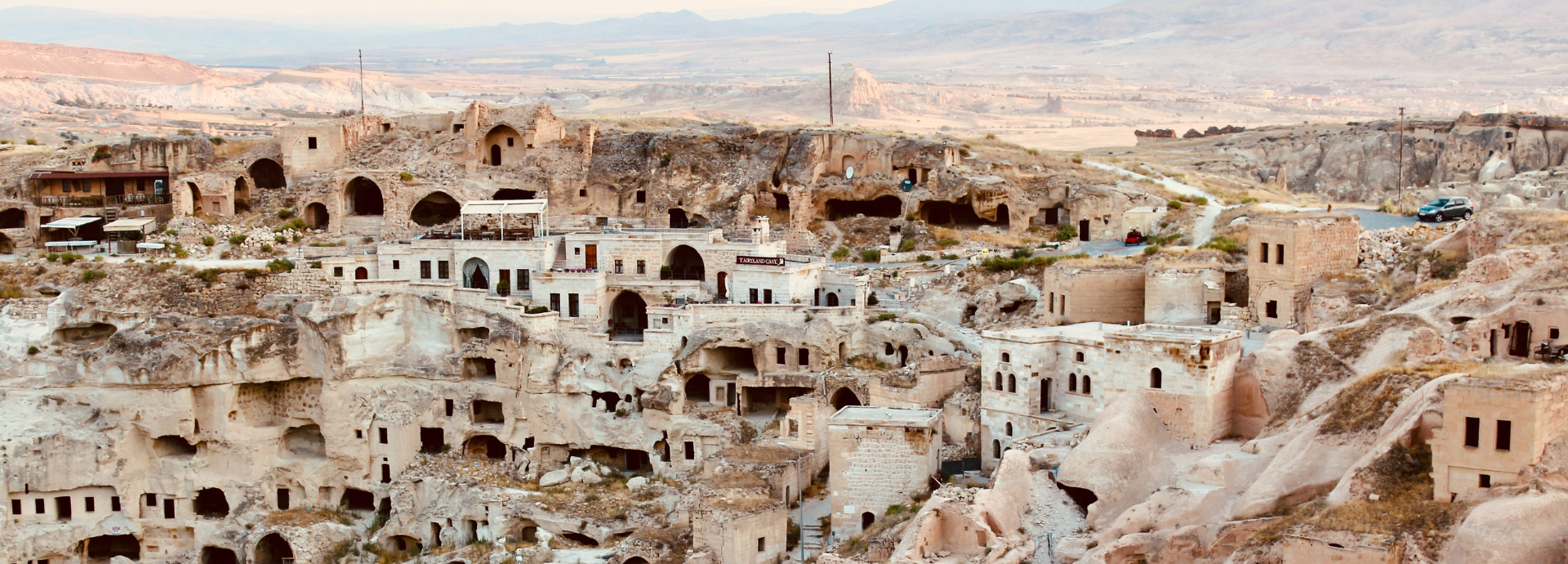
KEY INFORMATION TO PREPARE FOR YOUR JOURNEY
Turkiye, located at the crossroads of Europe and Asia, is a transcontinental country straddling both continents. Bordered by eight countries and surrounded by three different seas, Turkiye boasts a rich historical and cultural heritage.
Istanbul, the country’s largest city, straddles Europe and Asia and is known for iconic landmarks like the Hagia Sophia and the Blue Mosque. Other highlights include the ancient city of Troy, the unique rock sites of Cappadocia, and the stunning coastal landscapes of the Aegean and Mediterranean. Turkiye’s diverse offerings, from archaeological wonders to vibrant bazaars and picturesque coastlines, make it a captivating destination for travellers.
This information will assist in preparing for your departure and includes helpful travel hints for when you are there.
PLEASE NOTE: All pre-departure information was correct at the time of writing, but should be used as a guide only since requirements can change at short notice and without warning. Consult Smart Traveller or contact the Embassy of the Republic of Turkiye or the appropriate authority prior to departure to confirm all details.
AT A GLANCE
TURKIYE KEY FACTS
Time: GMT +3 hours | AEST -7 hours
Capital: Ankara
International Airport: Istanbul International Airport (IST)
Official languages: Turkish, Kurdish and Arabic, but English is widely spoken
Religion: The predominant religion of Turkiye is Islam, with Hanafi Sunni Muslims accounting for the majority
Electrical Current: 220V | European 2 round pin – Type C or F
Currency: Turkish Lira (TRY)
Australian Consulate General in Istanbul: Suzer Plaza, Elmadag Askerocagi Caddesi No. 15, Sisli, Istanbul 34367 | T: (+90) 212 393 3300 | E: consular.istanbul@dfat.gov.au | W: https://turkey.embassy.gov.au/
Visa: Yes – currently required for Australian passport holders – available online – refer to ‘Passport and Visa Requirements‘ for further details.
Ramadan, the spiritual month of Islamic Religion, is celebrated by Muslims in Turkiye Ramadan corresponds to the 9th month of the Muslim calendar with the end of Ramadan culminating in Eid al-Fitr – a three day holiday and celebration.
USEFUL WEBSITES
Smart Traveller – https://www.smartraveller.gov.au/destinations/europe/turkiye
Travel Doctor-TMVC – https://www.traveldoctor.com.au/destinations/turkey
Turkish Consulate General – https://sydney-cg.mfa.gov.tr/Mission
PUBLIC HOLIDAYS
January 1: New Year’s Day
February/March: Ramadan. Dates change annually. Upcoming ramadan dates: 2024: 10 March – 9 April | 2025: 28 February – 30 March
April 23: National Sovereignty & Children’s Day
May 1: Labour & Solidarity Day
May 19: Commemoration of Atatürk, Youth & Sports Day
July 15: Democracy & National Unity Day
August 30: Victory Day
October 29: Republic Day
RELIGIOUS HOLIDAYS
End of Ramadan: Eid al-Fitr* – 2024: 10 – 12 April; 2025: 30 March – 1 April
Feast of the Sacrifice: Eid al-Adha* – 2024: likely 16 – 19 June; 2025: likely 6 – 9 June
*As both of these holidays are based on the Islamic lunar calendar the precise date is determined by the moons cycle.
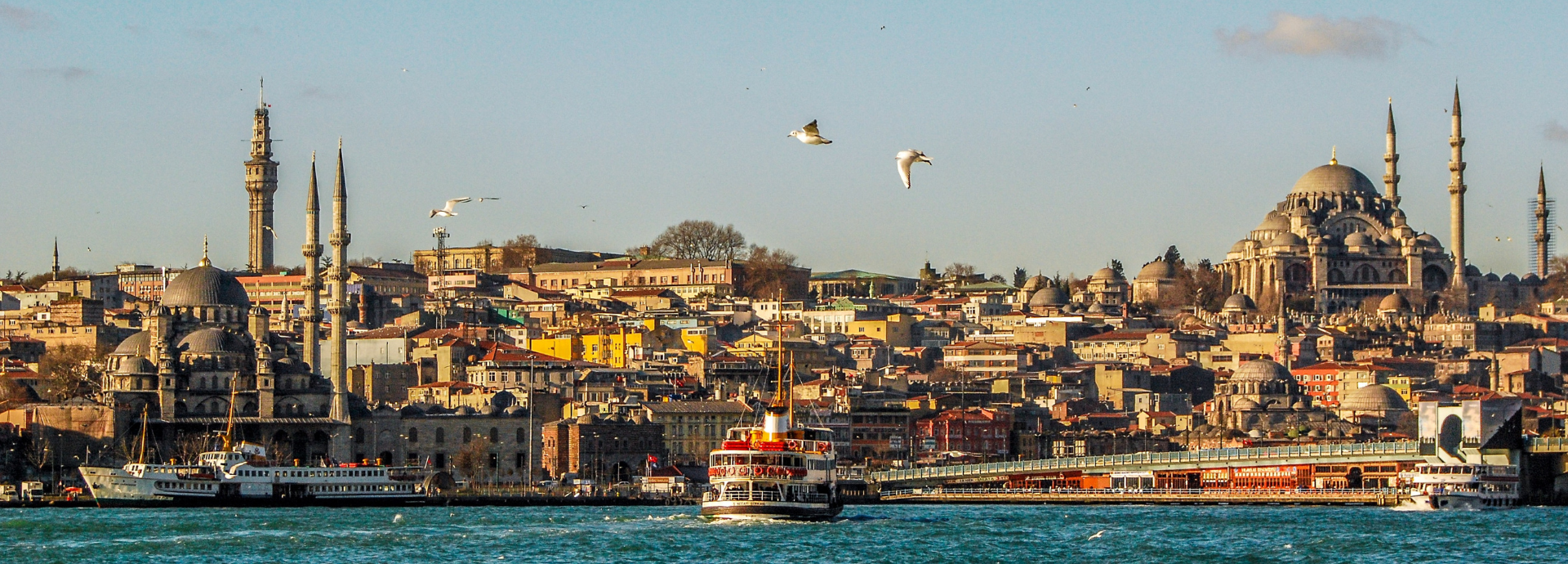
PASSPORT & VISA REQUIREMENTS
PASSPORTS
Your passport must be valid for at least six months after your return to Australia and have at least two blank pages for every entry and country you intend to visit on your journey. If your passport does not meet these requirements you must obtain a new one. The Australian Passport Office website is www.passports.gov.au.
It is a wise precaution to carry a photocopy of your passport separately and leave a copy at home. This will aid authorities in processing a new passport should yours get stolen or lost.
If you have dual citizenship and more than one passport, we strongly recommend that you use only one of these during your travels, as in some countries it is considered illegal to have two or more passports. Be sure to use the same passport on entry and exit from a country, and never surrender your passport.
If your passport name is different to your commonly used name, advise us of this and ensure your airline reservations match those of your passport name.
VISAS
Australian passport holders require a Visa to enter Turkiye. New Zealand passport holders are not required to obtain a visa for stays of up to 90 days.
Single entry visas (US$60) are valid for entry within 3 months from date of application, for a total period of 180 days and a maximum duration of stay of 90 days. This can be obtained prior to arrival, online using the following link: www.evisa.gov.tr/en/. Please only use this link to avoid paying money to an incorrect web page.

AIR ARRANGEMENTS
PASSPORT NAME
Your airline reservation must be made in your legal name as it appears on your passport (i.e. names on tickets and passports must match). If your passport name is different to your commonly used name, advise us of this and ensure your airline reservation name matches those on your passport.
SPECIAL REQUESTS
Do let us know your seat preferences and any special requests so we can advise the airlines accordingly, however airlines do not guarantee seat preferences and some airlines now charge extra for this service.
Be sure to mention any other special requests you may have such as dietary requirements, kids meals and wheelchair assistance.
FREQUENT FLYERS
Prior to your departure ensure you have provided your consultant with your frequent flyer details so they can be added to your flight booking.
If you intend to use frequent flyer miles for your air travel you must book your own flights directly with the airline. It is a good idea to hold onto all your boarding passes in the event you have a query regarding points on your return.
DIY FLIGHT ARRANGEMENTS
If your flights are not booked by us ensure you provide your consultant with a copy of your flight itinerary so that we can share this with our ground operators who are responsible for booking corresponding ground transfers.

CLIMATE, WEATHER & SEASONS
CLIMATE
The climate varies slightly depending on which region you are visiting.
Overall the best time to travel in Turkey is May to October, with temperatures ranging from an average of 22°C in the early and latter months, up to 33°C in summer months (June to September). Note that temperatures can reach as high as 46°C in the peak of summer – July/August.
Coastal Turkey has hot summers with little rain and mild winters. Inland areas have longer and harsher winters.
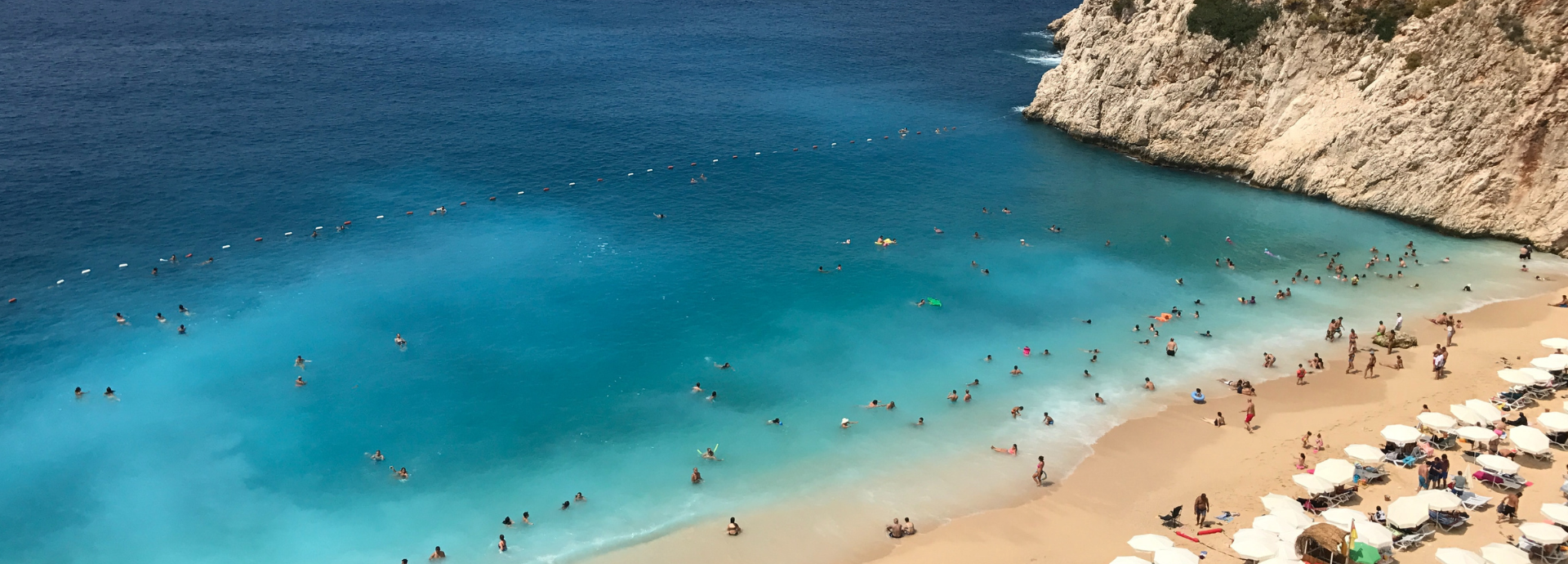
LUGGAGE & PACKING
LUGGAGE
Don’t take too much! You will regret bringing large unwieldy luggage & there is much to buy in Turkiye.
Most importantly please note that the trunk/boot of Turkish cars can be relatively small. So if you travel with a large, hard-shelled suitcase you may have a problem getting your luggage to fit.
Wheelie bags with soft sides are ideal, along with a small back pack or shoulder bag for day to day items.
All luggage should also be capable of withstanding rugged treatment.

WHAT TO PACK
We recommend you pack casual, light, cotton clothing for summer as it can be very hot. The evenings can be quite cool, particularly in winter, so packing an extra couple of layers is a good idea.
It is best to travel in clothes that you feel most comfortable in, however you do need to be aware of some cultural sensitivities. Women should dress modestly. Turkish women will never show their knees and rarely their shoulders in many regions across the country as religion still plays an important part in the daily lives of the locals. We recommend you do the same to avoid unwanted attention from men and women alike. Avoid short shorts and revealing dresses – or if you do choose to wear these styles we would suggest you have a scarf or pashmina with you in order to cover up should you wish, or need, to do so.
Laundry is offered in most major hotels in Turkiye, however please note that clothes are often hand washed so avoid handing over delicate or expensive items if you are at all worried about them. Most hotels offer overnight laundry so there is no need for excess clothing. You may be requested, or may prefer, to do your own under garments.
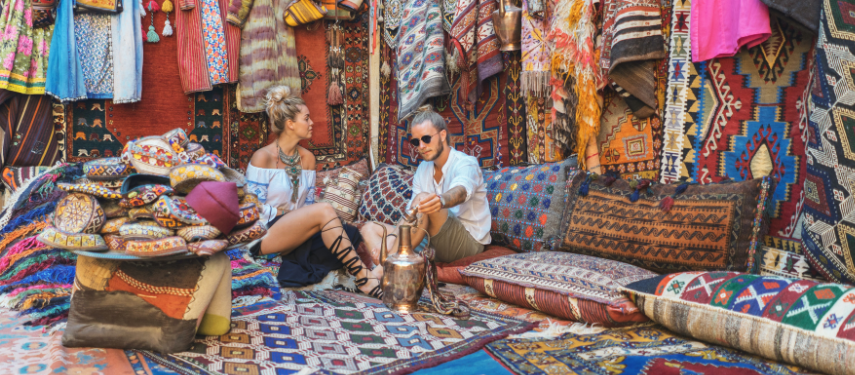
SHOPPING
Istanbul boasts great shopping with it’s famous historic Grand Covered Bazaar containing over 4,000 shops, and it’s fascinating Spice Bazaar. Traditional crafts include carpets & kilims, leather and suede, copper, bronzeware, gold and silver jewellery, meerschaum pipes, embroidery, ceramics & onyx. There are modern shopping malls and boutiques in Istanbul carrying the latest fashion and goods. There are also modern shops & traditional bazaars throughout the rest of Turkiye.
SHOPPING TIPS
- If in doubt, ask your guide.
- Be prepared to bargain, but be sure you really want an item before you begin & start by offering what you believe is a fair price – usually 50% of the asking price, and then work your way up from there.
- Be assertive, but be kind – life’s too short to bargain over a further $2!
- If you see something you like, buy it. You may not find that colour, style, fabric or design again – let alone finding the same store!
- Boutiques may accept credit cards, but few souk vendors will, so be sure to carry cash, including small amounts for swift, inexpensive purchases.
- Leave your valuables such as your passport in the hotel safe.
CLOTHING
- Light cotton shirts or t-shirts, both short & long sleeved
- Sweater/fleece
- Trousers – a combination of long & 3/4 length (2 to 3 pairs)
- Casual dress or skirt
- Casual evening wear
- A scarf or pashmina
- A good pair of covered walking shoes – Moroccan souks are not the cleanest
- Casual shoes & sandals or flip flops for around your hotel
- Socks & undergarments
- Gloves, beanie & scarf for High Atlas mountains & desert journeys
- Pyjamas
- Swimwear
ACCESSORIES
- Sunglasses
- Sun hat or cap
- Spare prescription glasses
- Contact lenses and saline
- Pen, paper, scrap book
- A novel
- Camera with spare memory cards
- Chargers for all electricals
- Adaptor plugs
- Small torch + batteries to use in the event of a power outage
- A scarf – for ladies to wear when visiting mosques or ancient sites
- Toiletries
- Ear plugs
- A water bottle
- Medical kit
INSURANCE
ENSURE YOU’RE INSURED
Although we hope you’ll never need it, having a comprehensive travel insurance policy is always highly recommended. No international travel is ever entirely without risk, and even the best laid plans can go awry.
Whilst we cannot recommend the right policy for you (as only you know you and what you need), below we have provided links to sites and articles that may help you navigate your way through the choices available.
PLEASE NOTE: The information provided here is subject to change at any time. Please always read the travel insurers’ relevant Product Disclosure Statements and refer to the Australian Government’s Department of Foreign Affairs & Trade’s (DFAT) Smartraveller website for up to date travel advice and their advice on Travel Insurance.
Whichever insurer you choose please provide us with a copy of your chosen policy, insurance certificate and all emergency contact details for our records.
WHAT WE OFFER
The Classic Safari Company is currently associated with the following travel insurance providers :
Each of the above insurers has varying strengths depending on the activities included in the trip you are undertaking. Their websites are easy to navigate and once you have entered your personal details and selected your preferences – be that to reduce your excess, include cover for cruising, increase your cover for cancellation or obtain cover for a pre-existing medical condition – the website will generate a quote. If you are satisfied with what is presented, you simply need to follow the steps to purchase your insurance policy online.
At what point in the booking process should I purchase travel insurance?
It is advisable to obtain comprehensive travel insurance at the time of confirmation/paying a deposit to ensure you are covered from the moment you book.
What should I look for when selecting coverage?
Most insurance companies will cover the basics such lost luggage or flight cancellations, but levels of medical cover vary from policy to policy, and the cover for global issues, such as pandemics, has changed significantly over the past few years. This excellent article, Travel Insurance Simplified, published on 07 April 2022, details what you need to look for when selecting coverage for your next trip. Smartraveller also publishes helpful advice on Travel Insurance.
What is the impact of DFAT travel advice?
Some insurance will not cover travel to countries where the Australian Department of Foreign Affairs & Trade (DFAT) is warning Australians to “Reconsider your need to travel” (Level 3) and most don’t cover travel to places with a “Do not travel” warning (Level 4). Most international travel insurance covers visits to Level 2 countries. DFAT travel advisories can change over time and this may affect your travel insurance coverage. You should always check the advice levels on the Smartraveller website.
How much does travel insurance cost?
Costs will vary depending on your age, destination, duration of your journey, preferred excess, cancellation cover, and if you have any pre-existing medical conditions. It is important to note that the inclusions with each policy are different so price is not the only factor you should consider when choosing travel insurance – cheaper policies often don’t provide the cover you might expect. You should read the small print carefully before purchasing any travel insurance policy to ensure it is suitable for your needs.
Can I use my credit card travel insurance?
Many premium credit cards come with complimentary travel insurance. If you elect to only be covered by your credit card travel insurance it is paramount that you understand the terms and conditions, policy availability subject to your age, trip duration and destination, item limits, sub-limits and exclusions that may apply. It is also worth noting that many credit card travel insurance policies automatically exclude cover for epidemics and pandemics and may not cover charter flights.
What about reciprocal health care agreements?
If you’re travelling to one of the 11 countries for which Australia has reciprocal health care agreements, you may also be able to access free health care at your destination under these arrangements. The exact benefits available to Australians in each partner country vary. At a minimum, you can generally access emergency medical and hospital care in any of these 11 countries by simply showing your valid Australian Medicare card.
Even if you’re travelling to a country that has a reciprocal health care agreement with Australia, it’s still a very good idea to get travel insurance as these care agreements can be quite limited. Travel insurance will also cover you for everything else besides your health, such as delays or cancellations.
HEALTH & VACCINATIONS
VACCINATIONS
It may be necessary to take medical precaution prior to, and whilst travelling. As we are not qualified to offer advice, we recommend you contact your GP or the Travel Doctor-TMVC who have the most up‐to-date information available. Requirements are highly personal depending on your health profile and the activities in your itinerary. Some vaccinations must be given well in advance of travel, so we suggest seeking medical advice as soon as you start to plan your trip. Be sure to ask what vaccinations or medications may be required to enter Turkiye and to re-enter Australia.
You can also refer to SmartTraveller for a guide as to what may be required, however you should always seek professional medical advice before travelling.
In Turkiye hospitals & pharmacies have well provisioned dispensaries, however it is recommended that you carry any medicines you think you may need (eg. Antihistamine, motion sickness/car sickness tablets).
Please ensure you advise us of any allergies or medical conditions prior to travel.
We also recommend that you have a dental check up prior to leaving home.
STAY HEALTHY ON YOUR TRAVELS
There is no reason to get ill in this part of the world as long as you are sensible. Even if you are used to dining out on the spiciest tagines you can find at home, the cuisine will still be vastly different to what you are accustomed to. Because of the different spices, herbs & the density and composition of water, you may find that there is initially an effect on your stomach. This normally passes within 48 hours as you adjust to the change in diet but if the condition persists you should consult a doctor.
To avoid health problems here are a few basic guidelines:
- Get all the vaccinations your doctor recommends.
- Do not drink the water unless you know it has been purified, boiled or it comes direct from a spring source. In city hotels don’t drink the water from the tap – ask for boiled or bottled water (you may have to purchase bottled water). You may wish to carry some purification tablets with you.
- Do not eat uncooked vegetables or meat, peel all fruit before you eat it, avoid salads and only eat food which has been recently cooked.
- Avoid ice in your drinks (unless the hotel has a water purification system).
- Be very particular about personal hygiene, keeping your hands very clean.
- We do not recommend you eat from street vendors unless you are brave!
- Cover up – use insect repellent, mosquito nets and wear long, loose, light-coloured clothing
- Don’t swim in fresh water unless told it is safe to do so
FOOD & DRINK
Turkish food is rightly famed for its cuisine; drawing from Central Asian, Middle Eastern, Eastern European and Mediterranean influence, using a distinctive blend of fresh produce and spices & herbs to create cuisine so delicious that it is considered among the best in the world. A significant amount of Turkish cuisine is vegetarian but lamb, beef and chicken, along with all sorts of seafood, is also widely available. Though most dishes are rich in flavour, they are not typically spicy-hot.
Here are some tips on food and drink specialties to try in Turkiye:
FOOD
Kebabs: Adana Kebab: Minced meat, often lamb, mixed with spices and grilled on skewers; Doner Kebab: Sliced layers of seasoned meat, usually lamb or chicken, cooked on a vertical rotisserie.
Mezes: Hummus: A classic Middle Eastern dip made from chickpeas, tahini, and olive oil; Baba Ganoush: Grilled and mashed eggplant mixed with tahini, garlic, and olive oil.
Baklava: A sweet pastry made of layers of phyllo dough, filled with chopped nuts and sweetened with honey or syrup.
Turkish Delight (Lokum): Chewy and sweet confections made from sugar, starch, and various flavorings like rosewater or citrus.
Pide: Turkish flatbreads similar to pizza, often topped with meat, cheese, and vegetables.
Manti: Tiny Turkish dumplings filled with spiced meat and served with yogurt and garlic.
Kumpir: Baked potatoes that are mashed and mixed with various toppings like cheese, sausage, and vegetables.
Iskender Kebab: Sliced doner kebab meat served over pieces of pita bread, topped with tomato sauce and yogurt.
Turkish Breakfast: A spread including olives, feta cheese, tomatoes, cucumbers, honey, jams, and various types of bread.
STREET FOOD
Simit: A sesame-crusted bread ring, often referred to as Turkish bagel, commonly enjoyed as a snack.
Midye Dolma: Stuffed mussels with seasoned rice and herbs, often sold as a popular street food.
Tavuk Döner: Chicken shawarma served in a wrap or as a sandwich.
Kokoreç: Grilled and spiced lamb or goat offal (intestines) wrapped in pita bread.
DRINK
Turkish Tea (Çay): Served in small tulip-shaped glasses, Turkish tea is a strong black tea typically sweetened to taste.
Turkish Coffee: A strong and finely ground coffee, traditionally brewed in a small pot called a cezve and served in a small cup. Don’t forget to try reading your coffee grounds for fun!
Ayran: A refreshing yogurt-based drink mixed with water and a pinch of salt.
Şalgam Suyu: Fermented turnip juice, often served as a tangy and spicy drink.
Rakı: An anise-flavored spirit, often enjoyed with mezze dishes. Drinking rakı is a social and cultural experience.
Salep: A warm winter beverage made from the powdered tuber of the orchid flower, typically flavored with cinnamon.
Pomegranate Juice: Freshly squeezed pomegranate juice is widely available and deliciously sweet.
Sahlep (Salep): A hot and comforting winter drink made from the powdered tuber of wild orchids, milk, sugar, and cinnamon.

When in Turkiye, don’t hesitate to explore local markets, traditional restaurants, and street food vendors to fully immerse yourself in the country’s vibrant culinary scene.
RAMADAN
Although Muslims are forbidden to drink alcohol, Turkiye is a secular state and alcohol is widely enjoyed. During Ramadan it is considered polite for visitors to avoid drinking alcohol in public and some local restaurants may not serve alcohol at all. Most restaurants serve alcoholic drinks and there are bars and nightclubs in the big cities, however, wine and spirits are heavily taxed and therefore expensive compared with local beers, which are less heavily taxed.

MONEY MATTERS
CURRENCY AND EXCHANGE
The unit of currency in Turkiye is the Turkish Lira (TRY), which is divided into 100 kurus. Australian dollars are not accepted in Turkiye, however both US dollars and Euro can be exchanged for Turkish Lira. Money can be exchanged at banks, at a Bureau de Change and often in larger hotels.
It’s best to take a mixture of money – credit card, debit card or travel cash card, plus cash just in case. Small denominations of USD or EURO are advisable – especially for tipping. If all else fails, have someone you can depend on who will make an emergency transfer of funds.
ATM machines are widely available in the larger cities and in airports, however do not rely soley on a cash card to fund your trip – if it does not work for any reason you will need to find a bank which is not always convenient. Please be vigilant if you do withdraw cash.
Larger hotels, souvenir shops (not souks & bazaars) and restaurants in the major towns and cities accept most credit cards. However do not rely on credit cards as your principal source of finance.
Visa & MasterCard are the most commonly accepted. AMEX is only accepted in limited establishments, so have a Visa or MasterCard as a back up.
It is recommended that you DO NOT change money on the black market as you are more likely to receive a lower rate of exchange or fake notes.
TELL YOUR BANK
We highly recommend you advise your bank of your destinations and travel dates. This should prevent any of your transactions being deemed as ‘out of the ordinary’ (and possibly stopped) due to their unexpected location.
SPENDING MONEY
Your itinerary and invoice will indicate inclusions and exclusions throughout your itinerary booked by The Classic Safari Company.
As a rule most hotels throughout Turkiye are offered on a ‘bed and breakfast’ basis only – allowing you the freedom to dine out if you wish. All additional meals, snacks and drinks will need to be paid for on your own account.
It is difficult to calculate exactly how much each person will spend. However, as a rough guideline, we suggest you budget around US$50-70 per person per day for extras such as additional meals, tips, drinks and personal purchases.
Of course if you plan to shop ’til you drop – and there is a lot of great shopping in Turkiye – then budget accordingly!
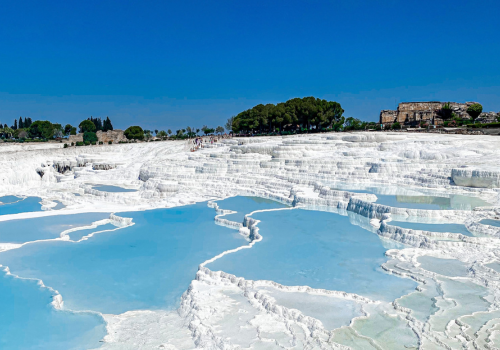
TIPPING
TIPPING
Tipping in Turkiye is called “bahşiş” and is an ingrained part of tourism. Salaries are low and bahşiş is regarded as an essential way of supplementing income. In Turkiye you will be expected to tip many people including your tour guides, drivers and ancillary staff such as waiters, & the hotel concierge. Please try to keep cool about this and don’t let it spoil your holiday. You will often feel like you are constantly tipping someone!
Try to keep your wallet stocked with small notes and use the following as a guide:
- Restaurants – it is customary to tip 10-15% of the bill amount.
- Drivers – either tip daily or at the end of your trip if you have the same car & driver for a number of days. On a daily basis tip the equivalent of about US$3 / TRY₺15 per group, per day.
- Tour guides – US$4 / TRY₺20 per group for a full day sightseeing tour.
- Hotel staff – US$3 / TRY₺15 per room per day.
- Local representatives – there is no need to tip local representatives who meets you at the airport.
Always carry extra money for those unexpected tips, for drivers, guides or staff that deserve that bit extra.
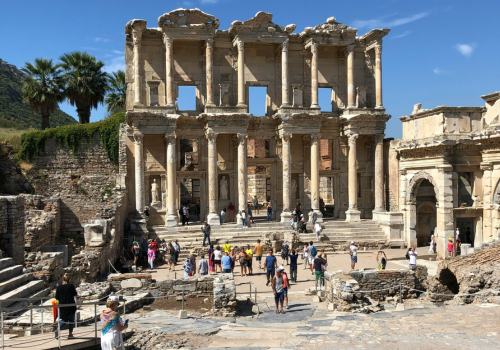
POWER, TECH & PHOTOGRAPHY
POWER
There are basically two main voltage systems used around the world: 110 Volt ‐ USA, Canada, Spain & Japan 220 Volt ‐ the rest of the world. In simple terms, the power supply available at the socket is roughly twice as powerful in 240V countries as in 110V countries.
The voltage in Turkiye is 220 Volts, therefore if you wish to use any electronic devices from Canada, the US or Japan you’ll need a voltage converter AND a plug adapter. Australia operates a 220V currency and therefore you only require an adapter for Australian appliances.
There are two different types of electrical sockets commonly found in Turkiye, types C and F. Older sockets are two-pin, just like European plugs (Type C), whilst the newer hotels have plugs that have two round pins with two earth clips on the side, so you may need an adaptor that has slots to accept the earth clips (Type F). If you do not already have any adaptor we recommend purchasing a multi-purpose travel adaptor, which will fit both.
Many adaptors also have a USB port so you can plug your smart phone, or I‐product directly into the adaptor.
For the latest & most up to date information about voltage and what adaptors to travel with refer to: www.korjo.com
ADAPTORS
Turkiye uses a 220V electrical current and a type C or F socket (European 2 round pin)

SMART PHONES & DATA
Smart phones can be wonderful travel companions. Not only will they help you stay in touch with friends and family, they’ll guide you through unfamiliar cities, enlighten you on local attractions, translate foreign languages and produce great photographs.
Left unchecked they can also wreak havoc with your travel budget!
The reason is that some (but not all) of the fun and useful functions smart phones perform require the downloading of data via an internet connection. Unfortunately, if you’re paying for data roaming it can be an expensive exercise and you run the risk of returning home to an expensive shock.
If you want to make the most of your mobile device, while avoiding unexpected and unpleasant charges, keep in mind the following tips:
- Buy an International Roaming Pack ‐ think about buying a pack from your phone network before departure in order to access cheaper rates
- Remove your regular SIM and replace it with a pre‐paid SIM either purchased before departure or upon arrival. Not only will you benefit from better prices for data, voice calls and SMS, but there will be a pre‐set limit on how much you can spend giving you some piece of mind.
- Turn off global roaming ‐ the problem with data roaming is not simply the exorbitant costs travellers are charged for downloading megabytes, it’s the fact that this data is often being sucked down without you even being aware of it.
To be safe, the easiest thing to do is simply disable data roaming.
We do NOT recommend taking advantage of free-wifi in public places such as airports and malls. The connection is often insecure, and you could run the risk of data & information theft. If you do need to go online, whether to check your emails, use a handy app or make an online booking – your best option is to find SECURE free or affordable Wi‐Fi.
PHOTOGRAPHY
Photography plays an important role in any holiday. Zoom lenses are a great asset as are wide-angle lenses for landscape shots. The best over-all lens to take would be a zoom in the 70mm-300mm range. Only if you are a keen birder, would you need a lens greater than 300mm. For digital cameras it is suggested that you bring two rechargeable batteries and ensure that you have adequate memory space.
Please respect local customs and feelings when taking photos. You may need to tip locals in order to take photos. It is forbidden to photograph certain places such as airports, dams, bridges, government buildings & military installations in many countries. If in doubt, ask!
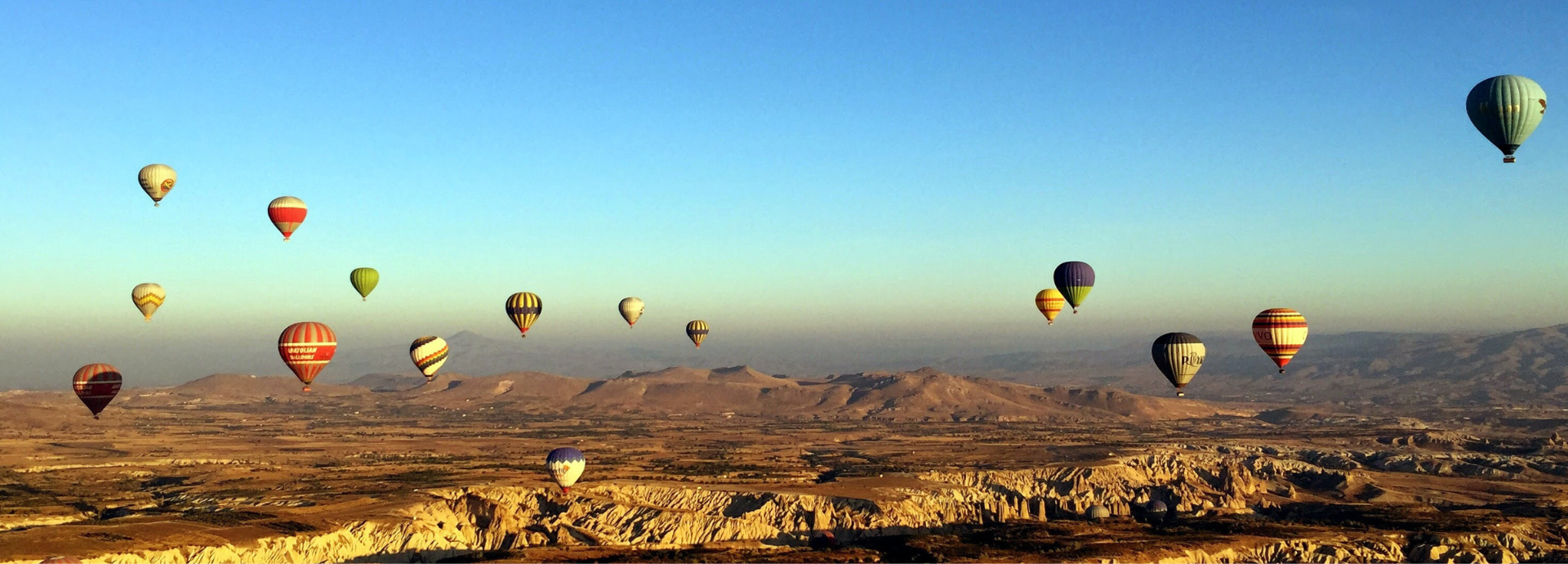
CLASSIC SAFARI CO TRAVEL APP
Your very own App for travel – let the countdown begin!
The CLASSIC SAFARI CO App is supplied courtesy of The Classic Safari Company. It is a very handy tool with the upside being that you can view all your travel documents on your device at any time, whether connected to the internet or not. It will be where we house all your travel documents. Our App along with emailed digital copies of your travel documents, will be all that you will require once travelling.
Therefore, it is important to take the time to become acquainted with The Classic Safari Co App, and contents, well before you travel.
To start viewing your travel documentation you will need to download, at no cost, The Classic Safari Co App on your Phone, iPad or Tablet by following these steps:
- STEP 1 : Be sure you have internet access
- STEP 2 : Open the App store on your device and search for ‘The Classic Safari Co’ or download on the Apple App Store or Google Play
- STEP 3: Once installed and opened, you’ll be asked for your User ID and your Unique Passcode. Please enter the following:
- USER ID: TCSC
- UNIQUE PASSCODE: NAME+FILENUMBER
Click accept and wait for your travel documents to download before starting your journey on the App.
HOW TO DOWNLOAD
Open the App store on your device and search for ‘The Classic Safari Co’. Alternatively, using your device click the icons below to download on the Apple App Store or Google Play
OUR APP LOOKS LIKE THIS:
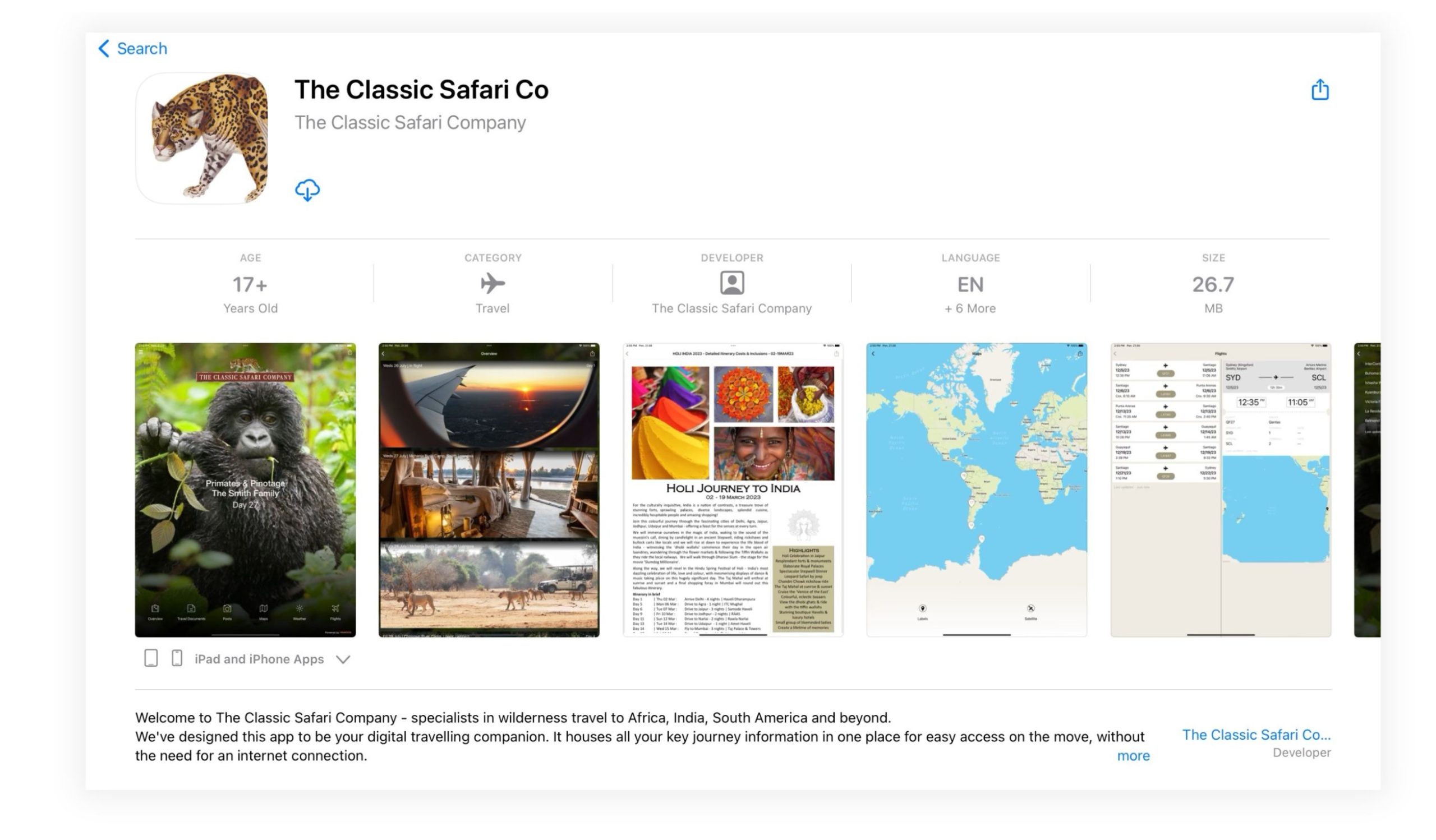
ON THE APP YOU WILL FIND:
- Your travel documents
- Destination information
- Maps
- Real time weather data
- E-tickets and flight information (if applicable).
ADDITIONAL OPTIONAL DOCUMENTS
We can also upload additional documents such as Tourist Visas, International Covid Certificates and your Travel Insurance Certificate if you wish to have them on hand as you travel. Please email any additional documents to us, ideally in .pdf format.
UPDATES & CHANGES
We will update all documents if and when changes occur, and prior to your departure we will furnish you with emergency contact information and any relevant travel vouchers.
OFFLINE USE
The greatest benefit of using our App is that once the initial download has occurred you will no longer require internet access to view what has been uploaded for you.
SECURITY
Please note that the software developer of our app (Vamoos) cannot guarantee the safety of personal data against identity theft, particularly if you are using a free wifi service whilst travelling. We do not recommend using free wifi services anywhere in the world.

ALREADY HAVE THE CLASSIC SAFARI COMPANY APP INSTALLED?
If you already have The Classic Safari Co App installed, to load a new trip you simply need to follow these steps:
- STEP 1: Open The Classic Safari Co App on your device and in the top left corner you will see 3 small horizontal lines (the burger menu). Click these and look for the words ‘Load New’… click this and then enter:
- USER ID: TCSC
- UNIQUE PASSCODE: NAME+FILENUMBER
- STEP 2: Wait for your travel documents to download before starting your journey on the App.
Should you have any questions about the App or the information uploaded for you please don’t hesitate to get in touch.
Thanks, have fun and let the countdown to your departure begin!
RECOMMENDED READING LIST
Birds Without Wings – Louis de Bernieres
The Bastard of Istanbul – Elif Shafak
A Mind at Peace – Ahmet Hamdi Tanpinar
The Black Book – Orhan Pamuk
Gardens of Water – Alan Drew
Portrait of a Turkish Family – Irfan Orga
Lords of the Horizon – Jason Goodwin
The Birds Have Also Gone – Yashar Kemal
Turkish Reflections – Mary Lee Settle
My Name Is Red – Orhan Pamuk
Silent House – Orhan Pamuk
More – Hakan Gunday
Memed, My Hawk – Yasar Kemal
Madonna in a Fur Coat – Sabahattin Ali
Arabesk – Barbara Nadel
The Red-Hair Woman – Orhan Pamuk
The Architect’s Apprentice – Elif Shafak
The Time Regulation Institute – Ahmet Hamdi Tanpinar
Belshazzar’s Daughter – Barbara Nadel
The Flea Palace – Elif Shafak
The Gaze – Elif Shafak
Honor – Elif Shafak
